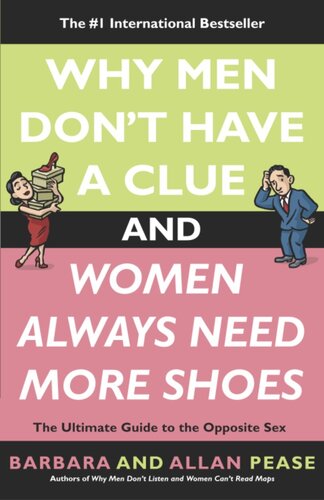
Why Men Don't Have a Clue and Women Always Need More Shoes
The Ultimate Guide to the Opposite Sex
کتاب های مرتبط
- اطلاعات
- نقد و بررسی
- دیدگاه کاربران
نقد و بررسی

January 12, 2004
Husband and wife team Barbara and Allan Pease attempt build on the success of their Why Men Don't Listen and Women Can't Read Maps (2001) with a volume that succumbs to sequelitis. Some new research leads to a familiar conclusion: men have problem-solving brains and women have processing brains, and never the twain shall meet. In the chapter"Seven Things Men Do That Drive Women Insane," for example, the Peases explore the problem of the remote control. Men aren't flipping through all those channels to be difficult or annoying--it's just evolution. Women, they explain, like to relax at the end of a long day with a show that involves"human interaction and emotional scenes." Men, on the other hand, enjoy whizzing through the channels to"analyze the problems in each program and consider the solutions needed." The authors also explain that men's brains are hard-wired to find certain physical female attributes sexy (no surprise there) and advise women to just accept it:"If you think it's absolutely necessary, treat yourself to a nose job or enhance your breasts for your birthday." Their flippancy may turn off some readers, and their attempts at comedy often fall flat. The Peases cite a good number of sources--theories of evolutionary biology and snippets of brain research, spiced up with vignettes and anecdotes--but it's hard to take their research seriously when they include such fluff as lists of what men and women say vs. what they mean ("Nice dress," when a man says it, means"Nice breasts"; women say"Do you love me?" and mean"I want something expensive"). Also, they might have explored, or even acknowledged, the possibility that nurture may have big hand in inter-gender misunderstanding too. Instead, women (the intended audience here) get advice like this:"The key is always to manage the males in your life, rather than arguing... or feeling frustrated with them. That way, both sexes can live happily ever after." If they say so.

January 19, 2004
Husband and wife team Barbara and Allan Pease attempt build on the success of their Why Men Don't Listen and Women Can't Read Maps (2001) with a volume that succumbs to sequelitis. Some new research leads to a familiar conclusion: men have problem-solving brains and women have processing brains, and never the twain shall meet. In the chapter"Seven Things Men Do That Drive Women Insane," for example, the Peases explore the problem of the remote control. Men aren't flipping through all those channels to be difficult or annoying--it's just evolution. Women, they explain, like to relax at the end of a long day with a show that involves"human interaction and emotional scenes." Men, on the other hand, enjoy whizzing through the channels to"analyze the problems in each program and consider the solutions needed." The authors also explain that men's brains are hard-wired to find certain physical female attributes sexy (no surprise there) and advise women to just accept it: "If you think it's absolutely necessary, treat yourself to a nose job or enhance your breasts for your birthday." Their flippancy may turn off some readers, and their attempts at comedy often fall flat. The Peases cite a good number of sources--theories of evolutionary biology and snippets of brain research, spiced up with vignettes and anecdotes--but it's hard to take their research seriously when they include such fluff as lists of what men and women say vs. what they mean ("Nice dress," when a man says it, means"Nice breasts"; women say"Do you love me?" and mean"I want something expensive"). Also, they might have explored, or even acknowledged, the possibility that nurture may have big hand in inter-gender misunderstanding too. Instead, women (the intended audience here) get advice like this: "The key is always to manage the males in your life, rather than arguing... or feeling frustrated with them. That way, both sexes can live happily ever after." If they say so.
Copyright 2004 Library Journal, LLC Used with permission.

























دیدگاه کاربران